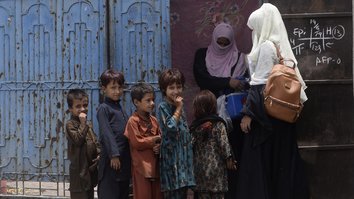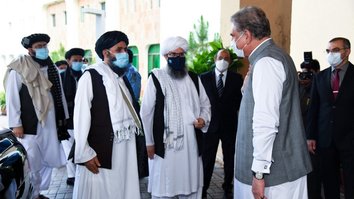ISLAMABAD -- A group of senior Taliban were warmly welcomed by Pakistani officials as they arrived in Islamabad Thursday (October 3), where the foreign minister called for a resumption of Afghan peace talks.
Mullah Abdul Ghani Baradar, the Taliban co-founder who spent eight years in a Pakistani prison, was greeted with hugs and smiles by Pakistani Foreign Minister Shah Mahmood Qureshi and spy chief Lt. Gen. Faiz Hameed, footage released by the ministry showed.
Pakistan was one of only three countries to recognise the Taliban regime, and its Inter-Services Intelligence (ISI) which Hameed heads, is widely suspected -- in particular by the Afghan government -- of backing the bloody insurgency in Afghanistan.
Islamabad denies the accusation.
![A screenshot from a Pakistani Foreign Ministry video shows Taliban deputy leader Mullah Abdul Ghani Baradar embracing Pakistani Inter-Services Intelligence (ISI) chief Lt. Gen. Faiz Hameed October 3 in Islamabad, Pakistan. [File]](/cnmi_st/images/2019/10/03/20264-beradar_with_isis_chief-585_329.jpg)
A screenshot from a Pakistani Foreign Ministry video shows Taliban deputy leader Mullah Abdul Ghani Baradar embracing Pakistani Inter-Services Intelligence (ISI) chief Lt. Gen. Faiz Hameed October 3 in Islamabad, Pakistan. [File]
![A photo posted by the Taliban shows its group delegation meeting with top Pakistani officials in Islamabad on October 3. [File]](/cnmi_st/images/2019/10/03/20265-talibanislamabad-585_329.jpg)
A photo posted by the Taliban shows its group delegation meeting with top Pakistani officials in Islamabad on October 3. [File]
Pakistan has helped facilitate talks between the Taliban and Washington in Qatar over the past year.
Scores of people were killed in Taliban bombings in Kabul during the first week of September amid the final moments of peace negotiations, prompting the US government to announce the cancellation of a meeting planned for September 8.
Taliban, a weakened group
The spiralling violence has exposed a clear tactic employed by Taliban leaders: use the group's continuing murder of Afghan civilians to pressure the Afghan government and its international allies at the negotiating table.
However, the Taliban's tactic ultimately proved unwise, as Taliban leaders have since found themselves in a weakened position after the nearly year-long peace negotiations were called off.
The weakened group has since taken to the road for help with its foreign backers, first with Russia and then with Iran.
Following the Taliban's trip to Iran, Afghan citizens denounced the group's promise to protect the Iranian regime's interests in Afghanistan even as the Taliban are busy sabotaging Afghan infrastructure projects.
This turmoil has exposed the growing divisions and discontent within the Taliban as increasing conflict over the group's leadership and its political direction further drives a wedge inside an already splintered organisation, according to Afghan Taliban leaders who have decided to speak out.
Now in Pakistan, Islamabad wants the talks to resume "to smooth the path for a durable, long-lasting peace and stability in Afghanistan", Qureshi was quoted as saying in the statement.
"War is not a solution to any problem. Talks are the only and positive solution to establish peace in Afghanistan," he continued.
Kabul dubious
The Afghan government, though, remains suspicious of the obvious warmth between Taliban leaders and Pakistani officials.
The Afghan-led, Afghan-owned peace process can lead to lasting peace, Sediq Sediqqi, spokesman for President Ashraf Ghani, said at a news conference in Kabul October 3.
"There will be no peace or stability in Afghanistan as long as centres for training, equipping and training terrorist groups like the Taliban operate on Pakistani soil," Seddiqi said, according to a tweet by the Afghan Government Media and Information Centre.
"Afghanistan demands that Pakistan destroy the safe havens of terrorists and of the Taliban and play a positive role in Afghan peace and regional security," he added. "The conditions that have always been emphasised for peace are the cessation of violence and of attacks by the Taliban against the Afghan people."

![A screenshot from a Pakistani Foreign Ministry video shows a member of the Taliban delegation, Mullah Amir Khan Mutaqi, handing over a present to Pakistani Foreign Minister Shah Mahmood Qureshi October 3 in Islamabad, Pakistan. [File]](/cnmi_st/images/2019/10/03/20263-amir_khan_mutaqi-585_329.jpg)







Does Pakistan like Al Quaeda and the Taliban? ISI does.
Reply2 Comment
America should impose sanctions on Pakistan the same as she did on Iran because Pakistan and Iran both support and train terrorists.
Reply2 Comment